

The University of Texas at Austin. The University of Texas at Austin Freshman Seminars First Year ForumFreshman Summer Reading Program.
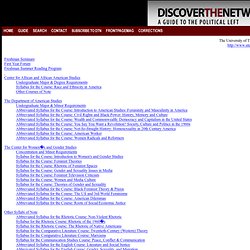
Sites/default/files/resources/Intro_to_Media_Literacy.pdf. Gateway Site for Media Literacy Education. List of Informative Speech Topics. Public Speaking: Ceremonial Speeches. The Epideictic or Ceremonial Speech Contents of this Section Public Speaking Home Page The Basic Course The Epideictic or Ceremonial Speech: An Overview An epideictic or ceremonial speech is a speech of praise or blame, celebration or thanksgiving, condemnation or mourning.
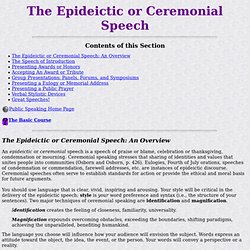
You should use language that is clear, vivid, inspiring and arousing. Identification creates the feeling of closeness, familiarity, universality. The language you choose will influence how your audience will envision the subject. Five basic guidelines for the epideictic speech (Cohn, 1992): use concrete rather than abstract terms use personal rather than impersonal references use simple rather than complex sentences use active rather than passive verbs use more repetition of ideas to enhance comprehension and memory.
How to Write Ceremonial Speeches. After your opening, you can organize the rest in one of two ways: 1 Enumerate the positives.
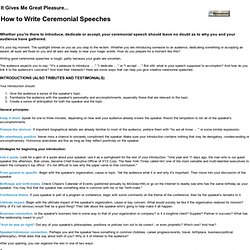
Make each of the speaker's virtues the topic sentence of a paragraph. Then fill the rest of the paragraph with biographical or anecdotal material that demonstrates the validity of the topic sentence. For example: [Characteristic] "Ross Perot is a triumphant entrepreneur in the best of the American tradition ... The more important the characteristic, the more time you should spend on it. 2 Biography, then personality. Summarize and build to a climax. The ending is key.
"What it all comes down to is that John Sawhill represents that all-too-rare combination of thinker, doer and leader, and this - plus all of his expertise and experience in energy and the environment - makes him practically a natural resource unto himself! Perhaps there's a quote that reveals how important those strengths and accomplishments are. Be specific about what you're celebrating. Global view. Talk symbolically.
Show modesty. Ceremonial Speech Topics: List of 17 Ceremonial Speech Topics. Ceremonial speech topics list with ten through identification and seven story writing topics through the method of magnification and enlarging.
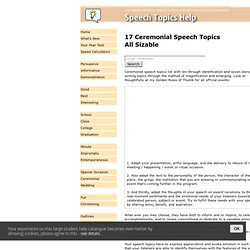
Look at thoughtfully at my Golden Rules of Thumb for all official events: What ever you may choose, they have both to inform and to inspire, to celebrate accomplishments, and to renew commitment to dedicate to a valuable principle. 10 Ceremonial Speech Topic Ideas Using The Identification MethodIdentification is the very heart of ceremonial public speaking. Try to create close feelings among the members of your audience.
Active and Coopeative Learning. Active Learning - General Concepts/Overview. Multimedia Educational Resource for Learning and Online Teaching. Free Online Course Materials. Resources - Schreyer Institute for Teaching Excellence. "Narrate, Curate, Share:" How Blogging Can Catalyze Learning.
Blogging | Viewpoint 'Narrate, Curate, Share': How Blogging Can Catalyze Learning By W.
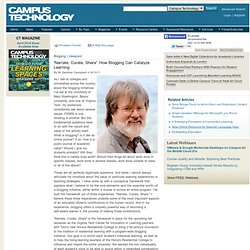
Gardner Campbell08/10/11 As I talk at colleges and universities across the country about the blogging initiatives I've led at the University of Mary Washington, Baylor University, and now at Virginia Tech, my audiences consistently ask about several issues. FERPA is one. These are all perfectly legitimate questions. "Narrate, Curate, Share" is the framework in place for the upcoming fall semester as the Virginia Tech Center for Innovation in Learning partners with Tech's new Honors Residential College to bring 21st-century innovation to the tradition of residential learning with a program-wide blogging initiative. College: Academic Civic Engagement: Academic Civic Engagement Pedagogy. Principles of Good Practice in Academic Civic Engagement Pedagogy Principle 1: Academic Credit is for Learning, Not for Service Credit in academic course is assigned to students for the demonstration of academic learning.
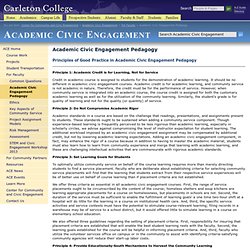
It should be no different in academic civic engagement courses. Engaged Pedagogy and Civic Engagement. Swasti Bhattacharyya is associate professor of religion at Buena Vista University.
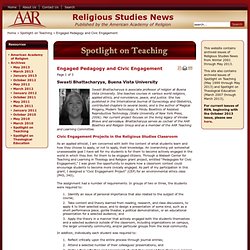
She teaches courses in various world religions, applied ethics, and nonviolence, peace, and justice. She has published in the International Journal of Gynecology and Obstetrics, contributed chapters to several books, and is the author of Magical Progeny, Modern Technology: A Hindu Bioethics of Assisted Reproductive Technology (State University of New York Press, 2006). Long-term academic benefits of service-learning: when and where do they manifest themselves? During the last several years, researchers have been garnering evidence concerning the benefits of service-learning, and urging its inclusion in the curricular mainstream.
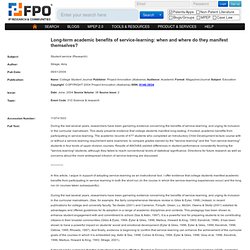
This study presents evidence that college students manifest long-lasting, if modest, academic benefits from participating in service-learning. The academic records of 477 students who completed an Introductory Child Development lecture course with or without a service-learning requirement were examined, to compare grades earned by the "service-learning" and the "non-service-learning" students in four kinds of upper division courses.
Results of ANOVAS yielded differences in student performance consistently favoring the "service-learning" students, although they failed to reach conventional levels of statistical significance. Directions for future research as well as concerns about the more widespread infusion of service-learning are discussed. It should not be surprising that this instructional method is effective. ED421481 98 Service-Learning and Teacher Education. ERIC Digest. Service-Learning and Teacher Education Jeffrey Anderson Source: Anderson, J. (1998).
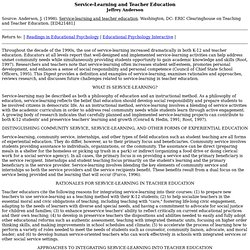
Service-learning and teacher education. Washington, DC: ERIC Clearinghouse on Teaching and Teacher Education. [ED421481] Return to: | Readings in Educational Psychology | Educational Psychology Interactive |